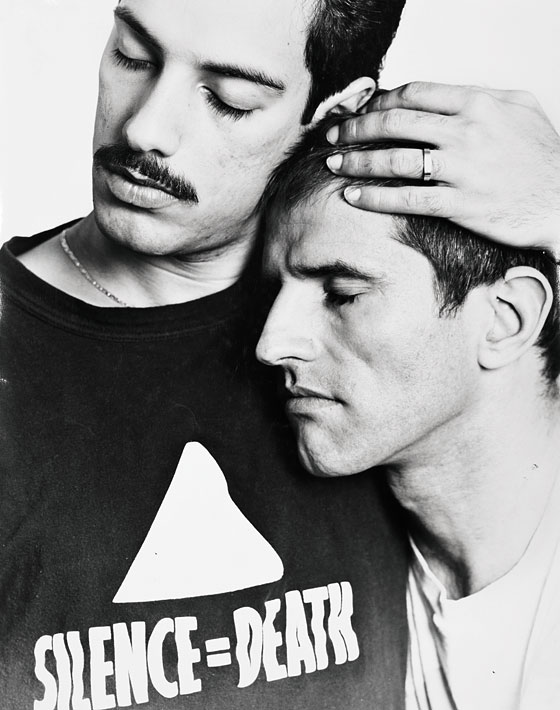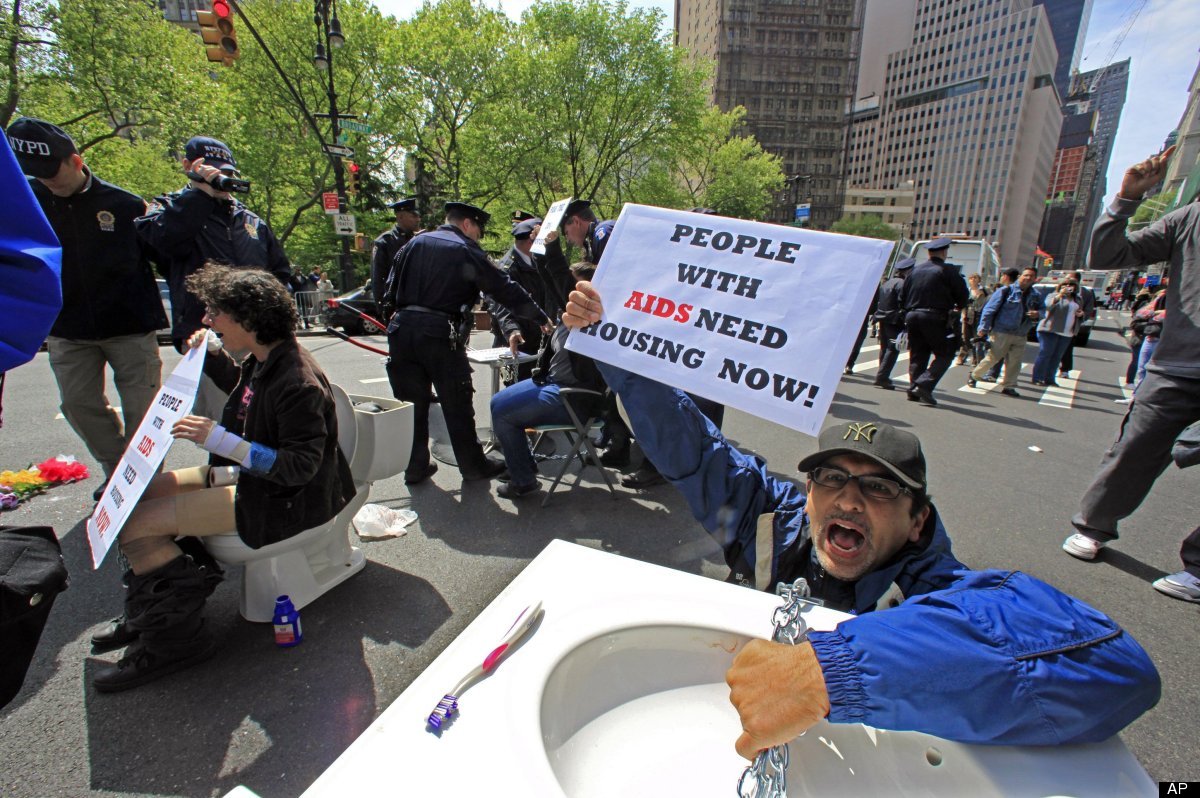
Luis Lopez-Detres and Eric Sawyer; Photo by Bill Bytsura, New York Magazine
“Sawyer (pictured with Luis Lopez-Detres, left, who has been involved with AIDS issues for the last two decades), a founding member, was symptomatic since 1980. His main concern was to steer the organization toward engaging with the housing crisis that was pushing poor people with AIDS into the streets. He co-founded the housing committee, which later became Housing Works. Today he works on AIDS issues at the U.N. “This treatment is not a cure,” he says. “And for 97 percent of people living with AIDS in the world, they have no access to the drugs at all. For them nothing has changed.”- David
Today we had a very special guest, Eric Sawyer, talk to us about out the 80s and 90s in NYC through the lens of the AIDS crisis and movement (Here’s the video of our talk!). Eric was a founding member of ACT UP, and its Housing Committee, which later became Housing Works. Here’s his oral history of the crisis/movement. Eric also restored my house in Harlem during this time, when so many of the buildings in the neighborhood were abandoned. He currently lives near CCNY, works for UNAIDS, and is one of the longest-living survivors of HIV/AIDS. To prepare for his visit I asked you to review documentary materials about this issue/time, and most of you watched “How to Survive a Plague,” and a few watched “United in Anger: A History of Act Up,” or reviewed the ACT UP Oral History Project. Your responses highlighted several important themes that Eric also addressed, including:
- “The fatal neglect that the U.S. government at all levels exercised in response to the AIDS epidemic of the eighties and nineties (Sam)… From New York City Mayor Ed Koch to President Ronald Reagan (along with his successor, George Bush Sr.), politicians were notoriously silent about AIDS, with the latter waiting six years and until nearly 30 thousand people had died to make a public statement about the disease. Which goes to show the devastating truth behind ACT UP’s motto, “Silence = Death.” Another fun fact, which another classmate has already touched on: filmmaker Scott Calonico produced a documentary short entitled When AIDS Was Funny in 2015, featuring audio footage of Reagan’s press secretary, Larry Speakes, laughing off the deadly “gay plague” that he claimed to know nothing about.”
- The role and significance of ACT UP: “A lot died from AIDS, but many more would have died if not for the actions of ACT UP, the AIDS Coalition To Unleash Power. They were a group dedicated to fighting for better treatment of AIDS as it pertained to homosexuals and all people in general. The main takeaway from ACT UP’s actions would have to be the lengths they took to see the change they wanted to happen take place. More than just performing marches and protests, they became science literate in regards to the issue. They observed how the issue was being handled in other countries and what drugs were available in order to come to the understanding that the US government wasn’t doing their own best in regards to the issue. ACT UP went as far as to draft their own version of a national research agenda that spurred the FDA’s work on some treatments (Amir)”
- ACT UP’s key strategies, including:
- “Becoming Expert” (Eric)… “ACT UP was very effective in its time. This was due to them not just demanding change, but enacting change. They immersed themselves in the scientific literature to fully understand the topic before taking real action to accomplish things such as procuring drugs not legalized in the US and drafting an agenda for the federal government to review” (Amir)….“Through historical and community knowledge, as in our community projects, ACT UP was able to strategize their activist plans….From ACT UP and TAG, we learn the valuable lesson that community change can occur even when there is little hope or motivation for these individuals. We see the strong influence of community planning and how it can be successful with the right strategies, determination, and dedication” (Minhal).
- “Identifying the Problem” (Eric) and Educating Others… “Their production of HIV/AIDS glossaries and their educating of people about the disease, including how to prevent it and slow its spread, was arguably their most effective contribution to stemming the crisis” (Jeffrey)…. “I think the dispersal of information may have been the greatest contribution ACT UP made. No longer were people so unaware of what was happening. Distributions of pamphlets and AIDS “glossaries” helped people understand HIV and AIDS and how they could stop it” (Patrick). Eric also spoke to the particular importance of ACT UP’s media strategy and catchy imaging.
- “Demanding Solutions” (Eric)… “Pushing for Change… It is important to realize the significance of this organization. Even though people faced death in the eyes, they still found the energy to protest against the many injustices they were subject to” (Brian)….”If this majority finally acts up and demands a change, change will occur. Evidence can be seen by the ACT UP organization that were successful in making the city pay more attention to the AIDS crisis starting in the late 1980s… I am curious to know what would happen if another housing crisis that is worse than that in 2006 occurs. What if it gets so bad that millions of people living in the city cannot afford to pay their rent. Will they use the tactics of ACT UP to fight with authority? Will they be successful because they “have no other choice”? Can people really challenge the largest growth machine in the world and be successful? I hope no such crisis occurs, but we do not have to wait for a crisis to occur to demand change” (Mohamed).
- Connections with current struggles: “In the past, we’ve read about the building New York City as well as current efforts of rezoning; in each we see the exclusion of and a failure of outreach by the government to the communities directly impacted. Similarly, this film showed ACT UP demonstrating against secret meetings by the N.I.H. as well as the lack of the voice of the AIDS community in deciding drug regulations…“Dr. Anthony Fauci is deciding the research priorities for the National Institute of Allergy and Infectious Diseases. We’re down here ’cause we think we should be deciding the research priorities, because these are the people who know what’s going on ’cause they’re dealing with it every day” (~50 minutes into the film)- (Kashaf)… “Act Up’s efforts against the government and private institutions are an example of a way to counteract or stop the negative effects of top-down city planning. If enough passionate people can organize to push for an approved AIDS treatment then certainly enough passionate people can organize to help fix the housing crisis in New York City… Discussion Questions: Can we again organize to fight against displacement and other adverse effects of city planning? What would it take? How would such a fight be different from that of the AIDS epidemic?” (Erica)
- The value of documentary films and oral histories: “How To Survive a Plague, a documentary directed by David France, provided an informative medium to display the passionate fight against AIDS. By utilizing interviews, past footage, and the in depth stories of Peter Staley and Bob Rafsky, the struggles that ACT UP and TAG were depicted perfectly” (Tony)… “It is fortunate that such films as the Oscar-nominated 2012 documentary How to Survive a Plague exist, because any queer person who has had to do their own research on the AIDS crisis knows the extent to which their community’s history has been suppressed and swept under the rug” (Sam).

Photo of an ACT UP protest at Occupy Wall Street in 2012 using similar direct action/street theater tactics that Eric and the Housing Committee used during the 1980s to demand that HPD provide medically appropriate housing for people living with HIV/AIDS… “Eric Sawyer, a founding member of the group that now includes chapters worldwide, said he and others returned for good reason…. When it comes to AIDS treatment and other services, he said, “big business is not funding anything, but they got the bailout.”- article by Verena Dobnik.
